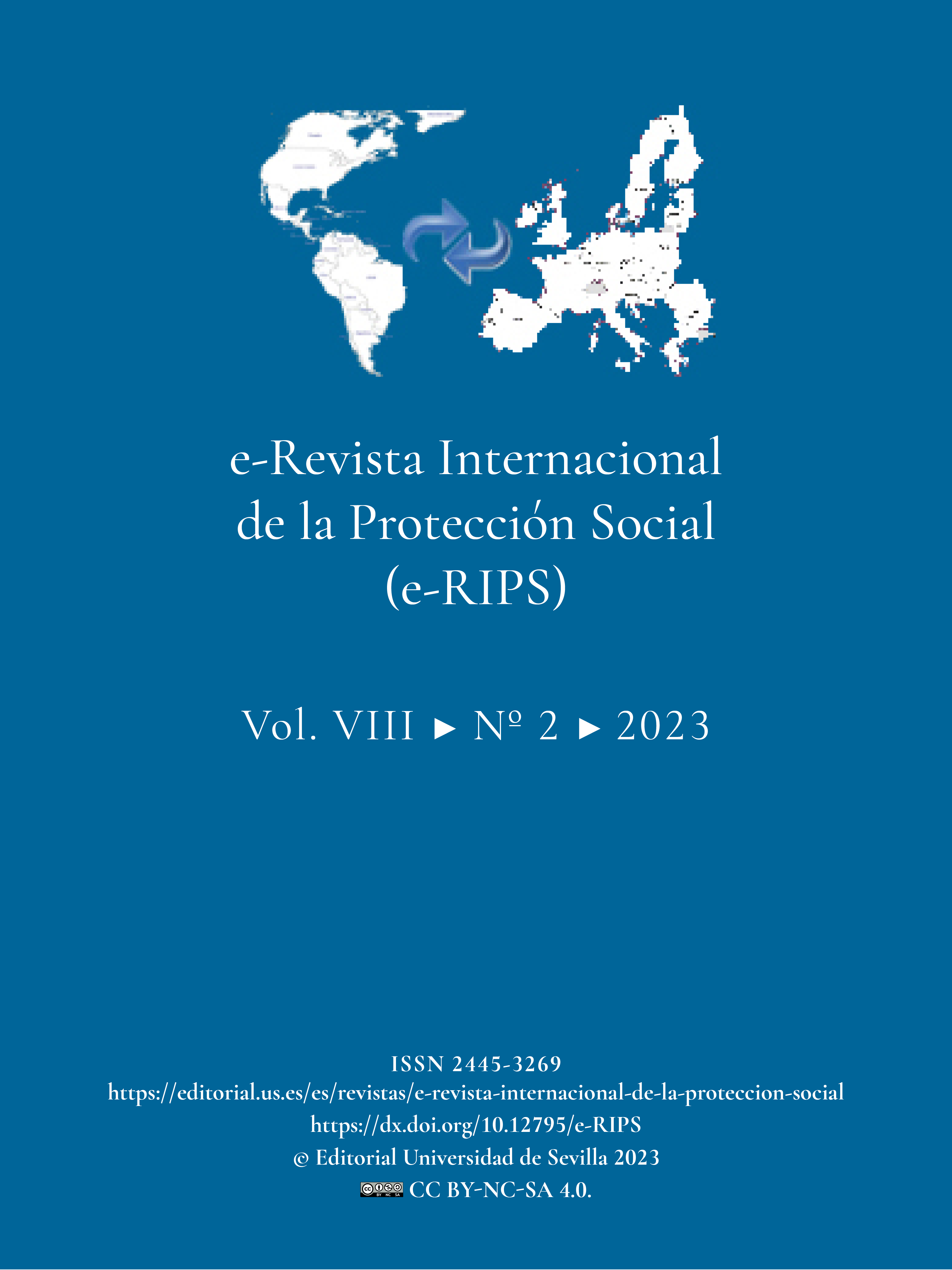Las vicisitudes de la flexiseguridad en la industria de videojuegos argentina
DOI:
https://doi.org/10.12795/e-RIPS.2023.i02.16Palabras clave:
Flexiseguridad, Videojuegos, Flexibilización, Empleabilidad, Capacitación permanente y vitaliciaResumen
En este trabajo analizamos la configuración fáctica de la flexiseguridad laboral en la industria de los videojuegos argentina. A tal fin, tomamos como referencia cuatro ejes previstos en dos instrumentos de soft law de la Unión Europea. A partir de allí, cotejamos las dimensiones del fenómeno con los datos cuantitativos disponibles en nuestro país, específicamente en el Sistema Nacional de Información Cultural y con los informes estadísticos provenientes del Observatorio de la Industria de los videojuegos argentina, a la vez que introducimos fuentes cualitativas primarias y secundarias. En efecto, concluimos que la flexiseguridad se configura de hecho en la industria de los videojuegos argentina; no obstante, el Estado deberá introducir modificaciones normativas en lo concerniente al seguro de desempleo, para que la flexiseguridad no se convierta lisa y llanamente en flexibilización.
Descargas
Citas
Adamini, Marina. 2020. «Resistencias frente a la precarización laboral en el sector de software y servicios informáticos. Un abordaje a partir del caso de los trabajadores informáticos de Tandil», Estudios del Trabajo, 59: 1-30, https://ri.conicet.gov.ar/handle/11336/113759
Añez, Carmen. 2005. «El capital intelectual: nuevo enfoque de la flexibilización laboral», Revista Venezolana de Gerencia, 10 (30): 310-324, https://www.redalyc.org/pdf/290/29003008.pdf
Castells, Manuel. 2004. «La Globalización Truncada en América Latina, la crisis del estado-nación y el colapso neoliberal», Centro de Estudios Miguel Enriquez, 1-15. http://www.archivochile.com/Chile_actual/20_tras_interna/chact_trasintern0007.pdf
Comisión Económica para América Latina y el Caribe (CEPAL). 2009. Manual de la micro, pequeña y mediana empresa: una contribución a la mejora de los sistemas de información y el desarrollo de las políticas públicas, CEPAL, GTZ, https://www.cepal.org/es/publicaciones/2022-manual-la-micro-pequena-mediana-empresa-contribucion-la-mejora-sistemas
Gabini, Sevastián. 2016. «Trabajo Flexible: Conceptualización y Estado del Arte del Constructo», Investigación Administrativa, 46 (118): 1-27, https://doi.org/10.35426/IAv45n118.05
García Lirios, Cruz. 2019. «Especificación de un modelo para el estudio de la flexibilidad laboral en IES y MiPyMEs formadoras del capital intelectual», TLATEMOANI Revista Académica de Investigación, 10 (30): 68-89. https://dialnet.unirioja.es/servlet/articulo?codigo=7340390
Grobler, Pieter A. y De Bruyn, Anita J. 2011. «Flexible Work Practices (FWP) – An effective instrument in the retention of talent: A survey of selected JSE-listed companies», South African Journal of Business Management, 42 (4): 63-78, https://doi.org/10.4102/sajbm.v42i4.506
Guevara Villalobos, Orlando. 2017. «Flexibilidad laboral en tiempos de distribución digital: Los desarrolladores de videojuegos independientes y sus malestares». Ponencia presentada al XXXI Congreso Alas Uruguay, Montevideo. https://www.easyplanners.net/alas2017/opc/tl/8216_orlando_guevara_villalobos.pdf
Banco Interamericano de Desarrollo (BID). 2009. Los videojuegos no son un juego. Los desconocidos éxitos de América Latina y el Caribe, BID, http://dx.doi.org/10.18235/0001869
Míguez, Pablo. 2017. «Trabajo, conocimiento y precariedad laboral en el capitalismo contemporáneo», Revista Ciencias Sociales, 93: 74-79. http://www.sociales.uba.ar/wp-content/blogs.dir/219/files/2017/05/REVISTA-93-074-M%C3%8DGUEZ.pdf
Quintana Hernández, José M. 2012. «¿Flexibilidad laboral, flexiseguridad o flexplotación?», Lan Harremanak: Revista de relaciones laborales, (26): 131-159, https://dialnet.unirioja.es/servlet/articulo?codigo=4260623
Tangian, Andranik. 2008. «Flexiguridad Europea: Conceptos (definiciones operativas), metodología (instrumentos de seguimiento) y políticas (implantaciones consistentes)», Lan Harremanak: Revista de relaciones laborales, 16: 99-153, https://dialnet.unirioja.es/servlet/articulo?codigo=2575398
Publicado
Cómo citar
Número
Sección
Licencia
Derechos de autor 2023 Julieta Melendi

Esta obra está bajo una licencia internacional Creative Commons Atribución-NoComercial-CompartirIgual 4.0.
e-Revista Internacional de la Protección Social es una revista de acceso abierto, lo que significa que todo su contenido está disponible gratuitamente para el usuario o su institución. Los usuarios pueden leer, descargar, copiar, distribuir, imprimir, buscar o enlazar con el texto completo de los artículos, o utilizarlos para cualquier otro fin lícito, sin solicitar permiso previo al editor o al autor. Esta definición de acceso abierto se ajusta a la Iniciativa de Acceso Abierto de Budapest (BOAI).
 4.0
4.0
A menos que se indique lo contrario, todo el contenido de la edición electrónica se distribuye bajo una " licencia internacional Creative Commons Atribución-Nocomercial-Compartirigual 4.0 Internacional". Puede consultar la versión informativa y el texto legal de la licencia aquí. Esto debe indicarse expresamente de esta manera cuando sea necesario.
En caso de aceptación del manuscrito, los autores ceden los derechos de la obra para su publicación a eRIPS. Revista Internacional de la Protección Social bajo el contrato de licencia Reconocimiento-NoComercial-CompartirIgual 4.0 Internacional (CC BY-NC-SA 4.0). Los autores conservan los derechos de autor y terceros están autorizados a compartir y adaptar la obra, siempre que cumplan con los términos y condiciones establecidos en la licencia.
- Usted debe dar crédito de manera adecuada , brindar un enlace a la licencia, e indicar si se han realizado cambios . Puede hacerlo en cualquier forma razonable, pero no de forma tal que sugiera que usted o su uso tienen el apoyo de la licenciante.
- Usted no puede hacer uso del material con propósitos comerciales .
- Si remezcla, transforma o crea a partir del material, debe publicar sus contribuciones bajo la misma licencia que el original.
Se puede encontrar más información en https://creativecommons.org/licenses/by-nc-sa/4.0/deed.es
Se permite y recomienda a los autores/as difundir su obra a través de Internet (p. ej.: en archivos telemáticos institucionales o en su página web) antes y durante el proceso de envío, lo cual puede producir intercambios interesantes y aumentar las citas de la obra publicada.











